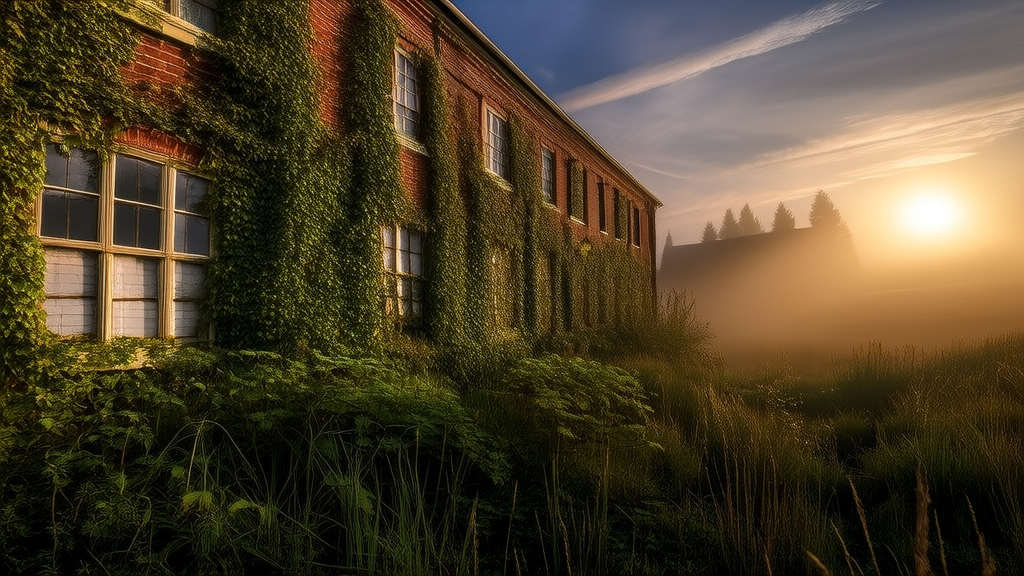🔮 Weird Tales & Urban Legends
The Whispering Walls of the Hollow House: A Journalist's Descent into Forgotten Shadows

The old brick building stood at the edge of the town, half-buried in ivy and time. No one knew exactly when it had been built, but the locals called it "The Hollow House." It was abandoned for decades, its windows broken, its doors warped by moisture and neglect. Yet, despite its decay, people would sometimes see lights flickering inside at night, or hear faint whispers drifting from the upper floors.
A young man named Eli, a curious journalist with a fascination for the strange, decided to investigate. He had heard the stories—of people who entered the house and never came out, of shadows that moved on their own, of a woman seen walking the halls in a white dress. But he wasn't afraid. He believed there was a rational explanation behind every legend.
Eli arrived at dusk, the sky painted in hues of orange and purple. The air was thick with the scent of damp earth and decaying wood. As he approached the house, the wind picked up, carrying with it a low, mournful sound that seemed to come from deep within the structure. He hesitated, then pushed open the rusted gate. The creak echoed like a warning.
Inside, the air was colder than outside. Dust swirled in the shafts of light that managed to penetrate the boarded-up windows. The floorboards groaned under his feet as he moved through the front room, where a dusty chandelier hung precariously from the ceiling. A grand piano sat in the corner, its keys yellowed and cracked. He touched the lid, and a single note rang out, sharp and clear, as if someone had just played it.
He climbed the creaking staircase, each step echoing louder than the last. The second floor was darker, the hallway lined with portraits whose eyes seemed to follow him. At the end of the hall, a door stood slightly ajar. He pushed it open and found a small bedroom, the walls covered in peeling wallpaper. A mirror hung crookedly on the wall, reflecting only the empty room behind him.
But as he turned, he saw something in the reflection that wasn’t there. A figure, tall and thin, standing behind him. He spun around, but the room was empty. His breath caught in his throat. He stepped back, and the mirror shifted slightly, as if adjusting to his presence.
He left the room quickly, descending the stairs and heading toward the back of the house. There, he found a cellar door, its iron handle cold to the touch. He opened it, revealing a narrow flight of steps leading down into darkness. A faint glow pulsed from below, like the flicker of a candle. He descended slowly, the air growing colder with each step.
At the bottom, he found a large room filled with old furniture, books, and artifacts. In the center stood a wooden table, and on it lay a journal. He picked it up, its pages brittle and yellowed. The entries were written in an elegant hand, detailing the life of a woman named Clara. She spoke of her husband, a man who had vanished without a trace. She described the house as a place of secrets, where time bent and memories lingered.
As he read, the temperature in the room dropped suddenly. The candlelight dimmed, and the whispering returned, this time louder, more distinct. He could barely make out words—fragments of conversation, laughter, sorrow. The air felt heavy, as if the room itself was alive, holding onto the echoes of those who had lived and died within its walls.
Eli stumbled back up the stairs, heart pounding. He emerged into the night, the wind now howling like a living thing. He looked back at the house, its windows now dark, the lights gone. He didn’t know if he had imagined the voices, the figure in the mirror, the warmth of the candlelight. But as he walked away, he couldn’t shake the feeling that the house was still watching, waiting for someone to return.
And somewhere in the silence, the door creaked open again.
Published on en
🔗
Related Sites
- AI Blog — AI trends and tech news